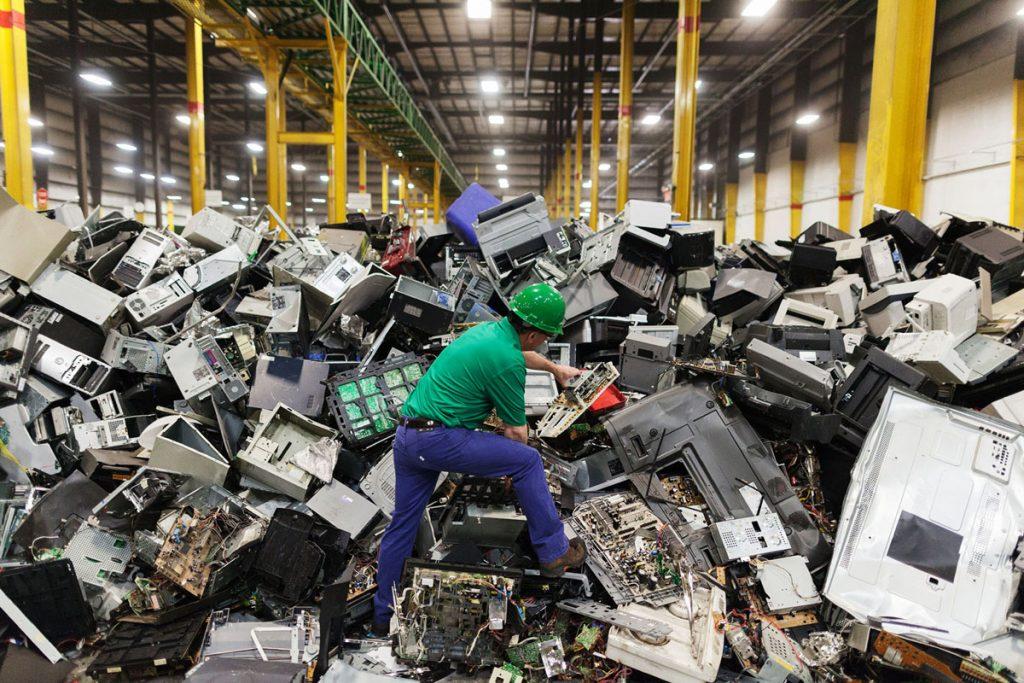In an era where technology is advancing at an unprecedented pace, electronic waste, or e-waste, has become a pressing issue. However, innovative companies worldwide are turning this challenge into an opportunity, transforming e-waste into a resource for business and a boon for the environment.
Breathing New Life into Old Solar Modules
In Hamburg, engineer Martin Wilke’s 2ndlifesolar company is giving discarded solar modules a second chance. With experts predicting over a million tons of solar modules ending up as waste in Germany alone by 2030, Wilke’s mission is to recycle as many of these modules as possible. Not only are they repurposed into small-scale solar panel systems for balconies, but valuable raw materials like silver and silicon are also extracted for reuse.
Rent, Don’t Buy: A Sustainable Approach to Electronics
Meanwhile, in Strasbourg, France, Elie Assémat, co-founder of the cooperative Commown, is working towards eliminating e-waste. Commown has been renting out smartphones, computers, and headphones since 2018, promoting sustainability and product longevity. This approach reduces e-waste and encourages manufacturers to design more durable and repairable devices.
Transforming E-Waste Management in India
India, a global dumping ground for e-waste, is transforming thanks to Swiss environmental scientist Dea Wehrli’s project, E(co)work. This initiative provides Indian scrap metal workers with safe, regulation-compliant work and storage spaces. This improves their working conditions and ensures the e-waste is processed safely and efficiently.
The Future of E-Waste Recycling
Looking ahead, a young startup has developed a process that could revolutionize the recycling market for solar modules. Their innovative machine separates valuable raw materials, such as silicon and silver, from discarded modules. This technology could recover 700 tons of silver from the old modules expected to accumulate in Germany by 2030, nearly half the amount used by the solar industry worldwide each year.
The Global Challenge of E-Waste
The need for more brilliant electrical and electronic equipment (EEE) is increasing globally. This surge is leading to a significant amount of outdated EEE ending up in landfills, posing severe threats to the environment and the health of living beings due to unsustainable ways of collection, treatment, and disposal of waste EEE, also known as E-waste.
The formal sectors are struggling to manage the increasing E-waste due to a lack of infrastructure, technology, and expertise required to collect and process the E-waste in an environmentally sound manner. Despite the fact that about 71% of the world’s population has incorporated E-waste legislation, there is a need to enforce and implement a common legal framework across the globe.
The paper highlights the gap among the stakeholders and their knowledge of the roles and responsibilities towards legalized E-waste management. It also points out the lack of awareness of extended producer responsibility (EPR) and producer responsibility schemes. Despite various legislations in force, numerous illegal practices such as acid leaching, open incineration, and unlawful dumping carried out by the informal sector are causing harm to the environment, natural resources, and the safety of unorganized and unskilled labor.
The paper discusses the crucial need for awareness amongst stakeholders, consumer behavior, and the global challenges and opportunities in this field to achieve a low-carbon, circular economy. It emphasizes the importance of a common legal framework, EPR and licenses, transformation of the informal sector, benchmark technologies, responsibilities of various stakeholders, and entrepreneurial opportunities to enhance the formal capacity.
The paper advocates for transparency, accountability, and traceability in the E-waste recycling chain, thus creating a greener environment and protecting our planet and natural resources for future generations.
The COVID-19 pandemic significantly affected our use of electronics and digital solutions, with people relying on electronics to keep them connected with co-workers, healthcare professionals, family, and social life. This increased reliance on electronics has led to a rise in E-waste. The paper also highlights the alarming rate at which natural resources are depleting and the need for a systematic process to put back the final products into the supply chain, thus creating a sustainable circular economy.
The e-waste challenge is significant, but as these stories show, it’s not insurmountable. By repairing, recycling, and renting electronic devices, we can reduce our dependency on raw material imports, reduce CO2 emissions, and protect our environment. The treasure in e-waste is there for the taking, and it’s a win-win for both business and the environment.
Managing E-waste is a global challenge requiring all stakeholders’ concerted effort. By implementing effective policies, raising awareness, and promoting sustainable practices, we can mitigate the environmental impact of E-waste and move towards a more sustainable future.
As we rely heavily on electronics daily, we must understand the importance of managing and recycling e-waste. It’s not just about protecting the environment but also about preserving our health and the health of future generations. The next time you’re about to throw away an old phone or laptop, think about the potential treasure it holds and consider recycling it. Remember, every small step counts towards a more sustainable future.

